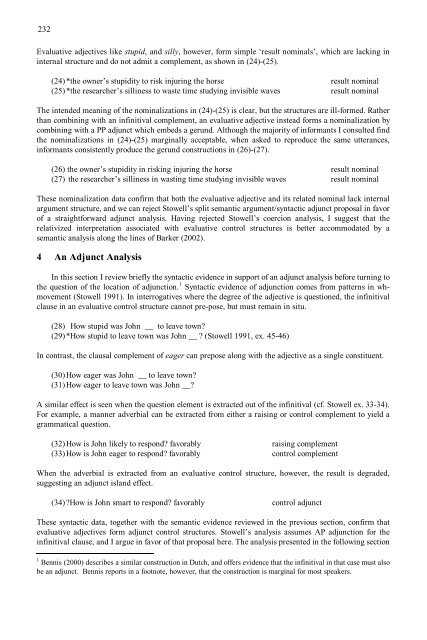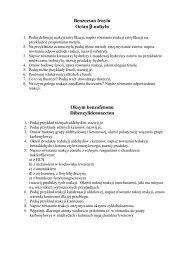Evaluative Adjectives: An Adjunct Control Analysis
Evaluative Adjectives: An Adjunct Control Analysis
Evaluative Adjectives: An Adjunct Control Analysis
Create successful ePaper yourself
Turn your PDF publications into a flip-book with our unique Google optimized e-Paper software.
232<br />
<strong>Evaluative</strong> adjectives like stupid, and silly, however, form simple ‘result nominals’, which are lacking in<br />
internal structure and do not admit a complement, as shown in (24)-(25).<br />
(24) *the owner’s stupidity to risk injuring the horse result nominal<br />
(25) *the researcher’s silliness to waste time studying invisible waves result nominal<br />
The intended meaning of the nominalizations in (24)-(25) is clear, but the structures are ill-formed. Rather<br />
than combining with an infinitival complement, an evaluative adjective instead forms a nominalization by<br />
combining with a PP adjunct which embeds a gerund. Although the majority of informants I consulted find<br />
the nominalizations in (24)-(25) marginally acceptable, when asked to reproduce the same utterances,<br />
informants consistently produce the gerund constructions in (26)-(27).<br />
(26) the owner’s stupidity in risking injuring the horse result nominal<br />
(27) the researcher’s silliness in wasting time studying invisible waves result nominal<br />
These nominalization data confirm that both the evaluative adjective and its related nominal lack internal<br />
argument structure, and we can reject Stowell’s split semantic argument/syntactic adjunct proposal in favor<br />
of a straightforward adjunct analysis. Having rejected Stowell’s coercion analysis, I suggest that the<br />
relativized interpretation associated with evaluative control structures is better accommodated by a<br />
semantic analysis along the lines of Barker (2002).<br />
4 <strong>An</strong> <strong>Adjunct</strong> <strong>An</strong>alysis<br />
In this section I review briefly the syntactic evidence in support of an adjunct analysis before turning to<br />
the question of the location of adjunction. 1 Syntactic evidence of adjunction comes from patterns in whmovement<br />
(Stowell 1991). In interrogatives where the degree of the adjective is questioned, the infinitival<br />
clause in an evaluative control structure cannot pre-pose, but must remain in situ.<br />
(28) How stupid was John __ to leave town?<br />
(29) *How stupid to leave town was John __ ? (Stowell 1991, ex. 45-46)<br />
In contrast, the clausal complement of eager can prepose along with the adjective as a single constituent.<br />
(30) How eager was John __ to leave town?<br />
(31) How eager to leave town was John __?<br />
A similar effect is seen when the question element is extracted out of the infinitival (cf. Stowell ex. 33-34).<br />
For example, a manner adverbial can be extracted from either a raising or control complement to yield a<br />
grammatical question.<br />
(32) How is John likely to respond? favorably raising complement<br />
(33) How is John eager to respond? favorably control complement<br />
When the adverbial is extracted from an evaluative control structure, however, the result is degraded,<br />
suggesting an adjunct island effect.<br />
(34) ?How is John smart to respond? favorably control adjunct<br />
These syntactic data, together with the semantic evidence reviewed in the previous section, confirm that<br />
evaluative adjectives form adjunct control structures. Stowell’s analysis assumes AP adjunction for the<br />
infinitival clause, and I argue in favor of that proposal here. The analysis presented in the following section<br />
1 Bennis (2000) describes a similar construction in Dutch, and offers evidence that the infinitival in that case must also<br />
be an adjunct. Bennis reports in a footnote, however, that the construction is marginal for most speakers.



